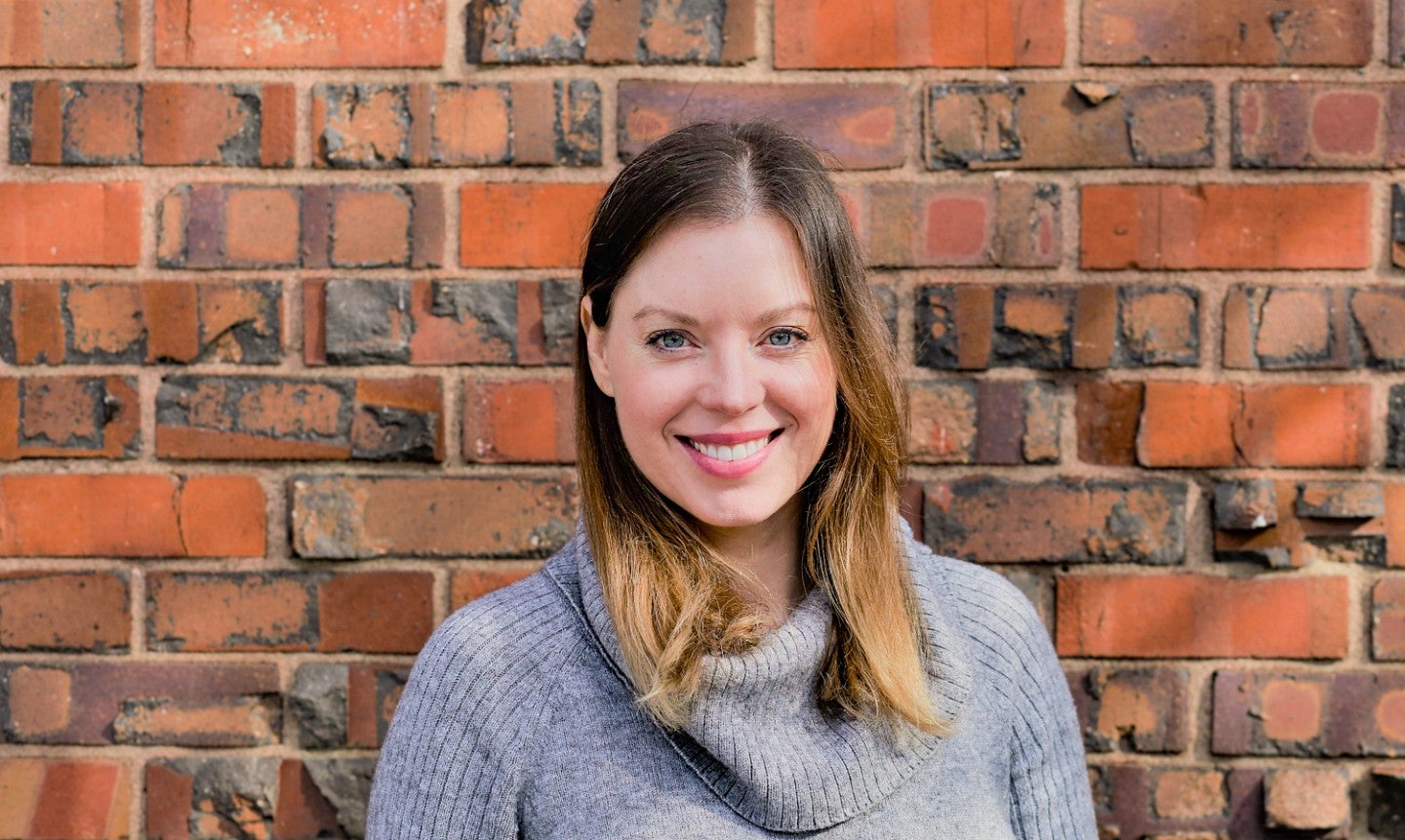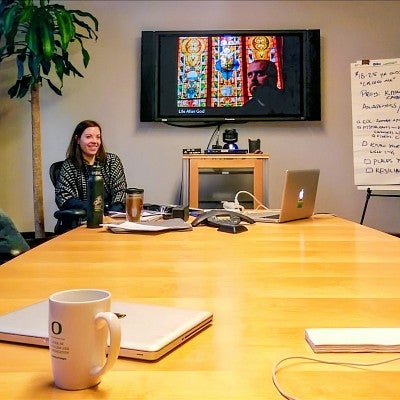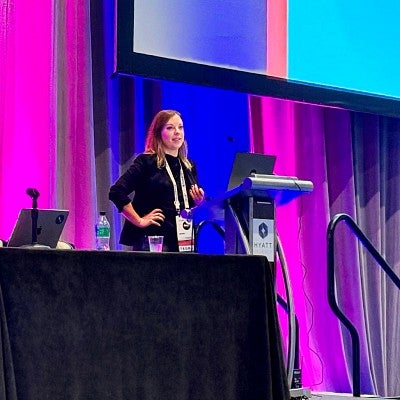Sara Roth ’15 brings empathy, adaptability and innovation to her leadership role at Oregon Public Broadcasting.

by Lily Reese, Class of ’27
Sara Roth ’15, executive editor of digital programming at Oregon Public Broadcasting (OPB), knows firsthand how audience engagement shapes modern storytelling.
“Journalism today is about conversation,” says Roth, a UO School of Journalism and Communication (SOJC) Multimedia Storytelling Master’s alum. “You can’t just publish a story and hope people find it — you have to bring the audience in.”
Roth should know. She’s spent over a decade working in print, television and radio news. Her broad experience has taught her that impactful journalism meets audiences where they are, whether on TikTok, Instagram, newsletters or emerging platforms.
At OPB, Roth leads a team responsible for posting and curating content, managing social media, sending push alerts and producing the daily First Look newsletter. Collaborating across editorial, marketing and membership teams, she ensures OPB’s journalism remains accurate, compelling and accessible, using digital tools to connect with audiences without compromising integrity.
A passion for storytelling led to a career in journalism
Roth’s journey to OPB and to digital content curation wasn’t a straight line. Originally from Maine, she studied at Bucknell University in Pennsylvania, bouncing between five majors before landing on creative writing, where she discovered her passion for storytelling.
Writing for her school newspaper deepened her interest in journalism, setting her on a path that would eventually lead to a career in multimedia reporting and newsroom leadership.
After college, Roth began her career working for magazines in New York. It wasn’t until she moved to Bend, Oregon, in 2009 that she felt a stronger pull toward journalism. Wanting to expand her skills beyond writing, she enrolled in the SOJC’s Multimedia Journalism Master’s program at UO’s Portland campus.
There she learned to tell stories across platforms, from text and audio to video and photo essays. “The most important thing I took from the SOJC was learning to tell stories from the story’s perspective,” Roth recalled. “It’s not about deciding, ‘Oh, we need to do a video.’ It’s about asking, is this a video story? A text story? An audio story? A photo essay? Or a combination of those things?”
One memorable project was an audio storytelling class with Professor Pro Tem Ketzel Levine of NPR, where Roth and a classmate produced a feature called “Portland’s Elvis” after following a local Elvis impersonator. The story connected Roth to Portland and reminded her why she loved journalism: discovering new perspectives, learning surprising things and meeting fascinating people.
That experience, combined with the collaborative environment at the SOJC, also shaped her leadership philosophy. “You learn how to work with people who have different strengths,” Roth said. “That experience helped me later in leadership roles, collaborating across departments and working with people who specialize in video, audio or digital storytelling.”

From investigative reporter to leader
Roth began her professional career as an investigative journalist, creating the first digital/investigative reporter role at KGW-TV. Her investigations sparked state and federal probes and became a model for TEGNA stations nationwide. She later transitioned to leadership, shaping digital news strategy as digital director at KREM-TV and senior editor at Verify, where she managed teams, expanded fact-checking initiatives that were recognized with Webby and Anthem awards, and grew audiences across emerging platforms.
In April 2025, she became executive editor of digital programming at OPB. Known for her empathetic leadership style, Roth draws on her experiences as a reporter to guide her team. “I remember what it’s like not being a leader,” she said. “I don’t want my team to ever feel overworked or unappreciated.”
She strives to combine lessons learned from past managers with the leadership she wishes she had experienced, focusing on support, balance and mutual respect.
Audience engagement drives success in digital news
Roth emphasizes that successful journalists must embrace constant evolution. Reflecting on her time in her SOJC master’s program, she says it gave her a bird’s-eye view of the industry and how stories are told across multiple platforms.
Learning, she stresses, doesn’t end in school.
“As a journalist, you’re always learning,” Roth said. “You have to accept that things are always changing, and that’s OK. You’re not going to do well if you think, ‘This is how it is now, and this is how it always will be.’”
For Roth, adapting to change is about staying curious, flexible and open to new ways of engaging audiences.
A central part of her approach is putting the audience first. At KREM-TV and KGW, she experimented with new formats, like vertical video, to make stories feel authentic and engaging. Her work at Verify reinforced the importance of a consistent, recognizable brand voice, growing the audience to over 500,000 followers, including more than 300,000 on TikTok.
“A clear, authentic brand allows audiences to immediately recognize and trust content,” Roth said.
Roth sees a shift in how investigative journalism operates in the digital era. Reporters need to engage audiences throughout the reporting process, not just at publication.
“Investigative reporters often work in their little caves, release a story and hope it’s noticed,” she said. “But today, audience work is critical.” Integrating audiences into newsrooms ensures important reporting doesn’t get buried and that vital stories reach and resonate with readers.
At OPB, Roth applies these principles to maintain the organization’s trusted, thoughtful tone while expanding digital reach.

Impact through journalism
Roth’s work has had tangible results. At Verify, she often heard from people whose lives were influenced by fact-checking efforts. “People would say, ‘If we hadn’t helped them, nobody else would have.’ That was powerful,” she said.
At OPB, the same holds true. She cites a recent collaboration with ProPublica on an investigation into Portland Trail Blazers owner Tom Dunton, where digital strategy amplified the story’s reach. Roth emphasizes that distribution is just as crucial as reporting: push alerts, newsletters and social media posts all help ensure investigative journalism reaches those who need it most.
Advice for emerging journalists
For students and early-career journalists, Roth stresses adaptability, persistence and networking. “You have to do both traditional and digital journalism, or you won’t make it,” Roth said. Embracing multimedia storytelling and understanding audience behavior are essential.
She also encourages persistence. “You succeed in journalism by being annoying, but nice,” she said. Reach out to editors on LinkedIn, attend industry events and build personal connections. “People will give you a chance if they see that you’re worth it.”
Her story exemplifies the SOJC’s mission: cultivating curiosity, adaptability and a passion for meaningful stories. From chasing Portland’s Elvis to leading digital innovation at OPB, Roth demonstrates how commitment to audiences, flexibility in storytelling and thoughtful leadership define success in modern journalism.
Lily Reese is a third-year journalism major at the SOJC, with a minor in food studies. She is passionate about storytelling, sustainability and lifelong learning. Lily loves to write, and her work can be found in Ethos magazine and Align magazine.
